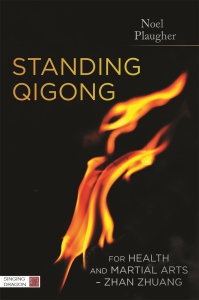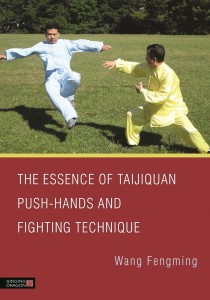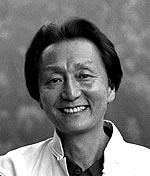Noel Plaugher shares insight into the martial arts exercise featured in his new book, Standing Qigong for Health and Martial Arts – Zhan Zhuang, and encourages readers to be more present in the moment.
“My book is about a still form of exercise that incorporates mind and body, and I hope that aside from the physical, readers will take heart and embrace the idea of being in the present. It sounds cliché but it seems all of us are involved in everything but the world in front of us.
cliché but it seems all of us are involved in everything but the world in front of us.
In our hectic and busy lives we forget that there must be moments where we stop for a time and look around us, or simply close our eyes and be in the present. I am not talking about having a full blown meditation on a commuter train, although what the heck, you may want to try it. I try often to do this, to have these small moments (not full blown meditation on a commuter train) as I work extraordinary hours and small breaks are nirvana to me. Even for a minute or two I have found it beneficial to walk outside look at the sun and sky, take a deep breath, and think about what is happening at this moment in time. It seems like the enemy for these moments are those devices which were sold to help us save time and make things easier. I haven’t really seen that materialize. Have you?
I am disappointed that all of the science fiction movies and TV I watched as a kid that painted such a rosy picture of the future, didn’t happen the way they described. I don’t mean the flying cars, which I guess, will never happen, I mean the promise of the ease of daily activities. The one thing I noticed in science fiction was that no one was ever in a hurry. In 2001: A Space Odyssey, when Dr. Floyd is briefing the others on the space station, they were completely relaxed. They were talking about other life in the universe and they could have been discussing color swatches for interior décor. “Open the pod bay doors, Hal,” And this is when Bowman is facing death in the vacuum of space! Sure, Star Wars has some excitement, but they are shooting lasers at each other. I don’t see that I have more leisure time because of technology, and that machines are doing things for me, so I can relax on the couch. Like most people I have ended up serving the machine! Now we work everywhere. Is that an advantage? Only to the work, I think.
We are all tethered to devices that are merciless task masters. ‘Ding!’ There is a text! ‘Swoosh!’ That is the email asking about the text. ‘Swoosh!’ There is that Facebook post from the kid who sat in back of me in high school. He found me on Facebook and now I look at his posts of his family vacation and ‘like’ pictures out of some kind of bizarre obligation. ‘Ding’ a text reminding me about something that I didn’t forget, but the text requires that I respond so that the other person doesn’t get offended. Now I insert the proper emoticon and…’Swoosh’ email arrives notifying me about a picture of a plate of food that someone thinks is incredibly important. With the internet, you can read just about everything ever written by Joseph Conrad, but we use it to send pictures of plates of food. For some reason we do all of this while life is streaming by and we give it barely a notice. What the heck!
These devices are so insidious they have wrapped their tentacles around our children as well. (or did we do the wrapping?) We are often found staring stoop shouldered at our palm size czars while our children are enthralled by a screen encompassing their entire field of vision, and we all MUST HAVE IT! What are we doing? Why are we doing it? Look at this device! Look at all the things it does! Perhaps we need to be asking if we need it to do all of these things.
I have stood talking to people looking at a phone, with earphones in their ears, and they have told me: ‘Don’t worry, I’m paying attention to you.’ Really? I beg to differ. Two of their senses are occupied and tasting me is out of the question.
Usually, we think of the phone or other device as our connection to the world, when in fact it is the exact opposite: It is our disconnection from the world. The world is happening in front of us and all around us. Do we even notice? Often I am criticized for not taking pictures of events. But I refuse to do it. I don’t want to document my life for myself or anyone else. I want to experience and live it. Not to mention the fact that I don’t think my life is all that interesting to anyone but me. A few events, may be worthy of note, but a daily dose of minutiae?
So are we disconnected? How disconnected can we be? Laws have had to be passed so that we don’t type one fingered messages to others while driving a one ton death machine on a public road! Now THAT is disconnected.
So what do we do? I don’t suggest turning your back on technology. That is unreasonable. I only think we need to be prudent in its use. Give attention to what is important, and realize that what you give your attention to, whether we realize it or not, is what is most important to you at that moment. Once when I was pushing my son on a swing and checking my email on my phone, I realized that what I was looking at was the most important thing to me at that moment. That really struck me, so I put it away and when I am interacting with my son I make sure I give him the same attention I demand of him.
What about emergencies? Let’s face it if we ever only used our devices for emergencies they would be dusty and full of cobwebs. If we put them away for a moment nothing will happen. Sadly, we all must realize that we are not as important as we think we are, and we are really only important to those close to us. How often do we give our time and attention to others at the expense of the ones that care about us?
So what do we do? There are small things we can do, and I have provided some suggestions below. However, having an overall awareness of the fact that we are making choices is important. We are not helpless, unless we choose to be.
These are some things that I have found useful.
- When you are by yourself, periodically, at least once a day, turn off your phone, or at least the volume, and be alone with your thoughts. If you have to ask what you should think about, do this more often than you were originally planning.
- Require full attention of those that interact with you. No checking texts while speaking with you. No glancing to see if anything came in. I have instituted a “walk away” policy for myself. If when speaking with someone they choose to do other things, so do I.
- Do the same as above for others. (How often did I catch myself doing this stuff? Too often.)
- Look in the night sky and try to find a constellation of any kind.
- Look at the daytime sky and observe the clouds or anything that is there.
- Stop and think about how you are right now. What do you feel?
- If you don’t like your child spending so much time on a device, then make it stop.
- Breathe deeply by inhaling for a count of 5 and exhaling for a count of 5.
- Choose to use technology to make your life easier and realize that nothing is an emergency but an emergency.
When I was writing my book I tried to talk about being present, as standing qigong is definitely something that helps cultivate this practice, but I wouldn’t want someone to think that they can’t simply start being present immediately. I hope you read my book and the others that are coming. Now, turn off your ringer and try the suggestion where you take in a breath for a count of 5 and then exhale for a count of 5. Do it now. Breathe in: 1, 2, 3, 4, 5. Great! Now, without holding your breath, breathe out for 1, 2, 3, 4, 5. There, that is it. Look around you. Look up, look down. This is where you are. Doesn’t that feel good? This is where you are.”

